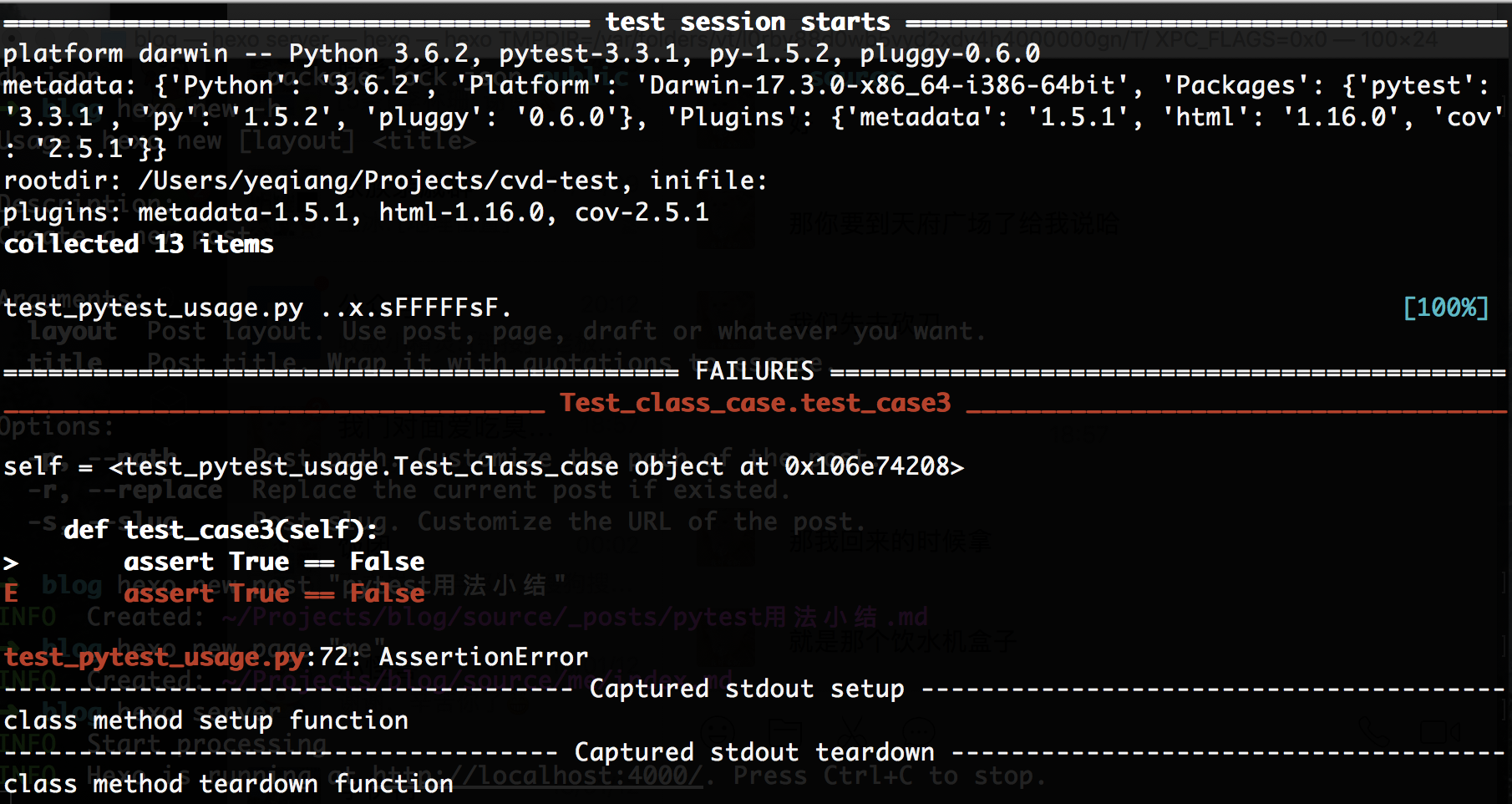pytest最常用法总结,当然不止这一点功能。关于更多更强大的插件,可以根据自己需要来定制。
安装 #
pytest 安装和使用都非常简单, 只需pip install pytest
编写测试代码 #
使用pytest,不需要像unittest模块一样,pytest使用的是python自带的assert,如:
def test_global_function():
assert 1 == 1
使用pytest.mark #
pytest.mark 用于给测试方法打上标签,在稍后的执行中会讲到如何使用marker
@pytest.mark.marker_self
def test_global_function():
assert 1 == 1
使用pytest.fixture #
@pytest.fixture
def google_url():
return "http://google.com"
setup 和 teardown #
setup和teardown方法作用范围,分为全局作用,类作用,方法作用
- 全局:作用于全局测试函数
- 类: 作用于自身类
- 类方法: 作用于类函数
简单举例: #
# 全局
def setup_function(function):
print("setup function global")
def teardown_function(function):
print("teardown function global")
# 类
class Test_fixture:
@classmethod
def setup_class(cls):
print("class setup method")
@classmethod
def teardown_class(cls):
print("class teardown method")
# 类方法
def setup_method(self, method):
print("class method setup function")
def teardown_method(self, method):
print("class method teardown function")
pytest配置文件 #
配置文件名为pytest.ini setup.cfg tox.ini 关于配置文件优先级请查阅官方文档
简单举例:
[pytest]
addopts = --maxfail=2 // set default pytest options
python_classes = *Api //execute all *Api like TestSingUpApi or TestSignUpApi
更多配置内容参见https://docs.pytest.org/en/latest/customize.html
执行方法 #
此处只列举了较常用的参数,主要用于演示marker和选中,和文件,类,函数的选中
# 执行方法:pytest [options] test_file::Test_class::test_method [plugin-options]
# 执行有标记为marker_self的case
pytest -v -m "marker_self" test_demo.py::Test_fixture::test_fixture_demo
# 执行有标记为marker_self 且 marker_other与的case
pytest -v -m "marker_self and marker_other" test_demo.py::Test_fixture
# 执行有标记为marker_self 或 marker_other的case
pytest -v -m "yeqiag or marker_other" test_demo.py
# 执行测试文件中某一个测试类的一个测试case
pytest -v test_demo.py::Test_fixture::test_fixture_demo
# 执行测试文件中某一个测试类
pytest -v test_demo.py::Test_fixture
# 执行测试文件
pytest -v test_demo.py
全部代码 #
"""
1.setup teardown 作用范围:
全局的 作用于 全局的单个函数,
class 作用于 该类的单个函数
2.mark的使用
使用全局的skip, xfail来标记并略过一部分的测试case
使用自定义的marker来区分测试等级
3.fixture的作用范围
全局作用
class内部作用
"""
import pytest
def setup_function(function):
print("setup function global")
def teardown_function(function):
print("teardown function global")
def test_simple_method():
assert 1 == 1
@pytest.mark.marker_self
def test_global_function():
assert 1 == 1
class Test_class_case:
"""
Must Know These Things
1. 测试类 init函数不会被执行
2. 测试类 属性只读
"""
@classmethod
def setup_class(cls):
print("class setup function")
@classmethod
def teardown_class(cls):
print("class teardown function")
def setup_method(self, method):
print("class method setup function")
def teardown_method(self, method):
print("class method teardown function")
@pytest.mark.xfail(reason="一定失败")
def test_case0(self):
assert 1 == 0
def test_case1(self):
assert 1 == 1
@pytest.mark.skip(reason="我知道这是错的")
def test_case2(self):
assert 1 == 0
def test_case3(self):
assert True == False
@pytest.fixture
def google_url():
return "http://google.com"
@pytest.mark.marker_self
def test_fixture_google(google_url):
assert google_url == "http://google.com"
assert 1 == 0
def test_(google_url):
assert google_url == "http;//google.com"
def test_baidu_url(baidu_url):
assert baidu_url == "http://baidu.com"
class Test_fixture:
@classmethod
def setup_class(cls):
print("class setup method")
@classmethod
def teardown_class(cls):
print("class teardown method")
@pytest.fixture
def baidu_url(self):
return "http://www.baidu.com"
@pytest.mark.marker_self
def test_fixture_demo(self, baidu_url):
assert baidu_url == "http://www.baidu.com"
assert 1 == 0
@pytest.mark.marker_other
def test_fixture_demo_2(self, baidu_url):
assert baidu_url == "http://google.com"
@pytest.mark.marker_self
@pytest.mark.skip(reason="没有原因三")
def test_self_marker_demo0(self):
assert 10 == 0
@pytest.mark.marker_self
def test_self_marker_demo1(self):
assert 10 == 0
@pytest.mark.marker_self
@pytest.mark.marker_other
def test_fixture_demo_google(self, google_url):
assert google_url == "http://google.com"
执行结果截图

未完待续…